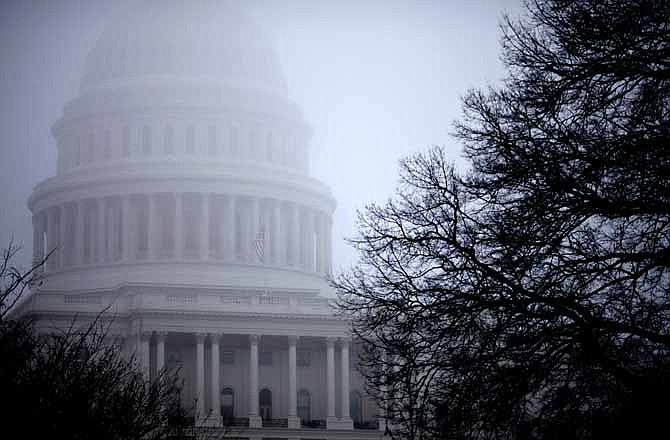WASHINGTON (AP) - Workers probably won't feel the full brunt of next year's tax increases in their January paychecks, but don't be fooled by the temporary reprieve.
No matter what Congress does to address the year-end fiscal cliff, it's already too late for employers to accurately withhold income taxes from January paychecks, unless all the current tax rates remain unchanged, which is an unlikely scenario.
Social Security payroll taxes are set to increase on Jan. 1, so workers should immediately feel the squeeze of a 2 percent cut in their take-home pay. But as talks drag on over how to address other year-end tax increases, the Internal Revenue Service has delayed releasing income tax withholding tables for 2013.
As a result, employers are planning to withhold income taxes at the 2012 rates, at least for the first one or two paychecks of the year, said Michael O'Toole of the American Payroll Association.
If employers don't withhold enough taxes in January, they will have to withhold even more taxes later in the year to make up the difference. Otherwise, taxpayers could get hit with big tax bills, and possibly penalties, when they file their 2013 returns.
The tax increases could be steep. If Congress fails to act, workers at every income level face significant tax increases next year as part of the year-end "fiscal cliff."
A taxpayer making between $50,000 and $75,000 would get an average tax increase of $2,400, according to the Tax Policy Center, a Washington research group. If the worker is paid every two weeks, that's about $92 a paycheck, on average.
Someone making between $75,000 and $100,000 would get a tax increase averaging nearly $3,700. If the worker is paid every two weeks, that's about $142 a paycheck.
O'Toole said it would take most employers two weeks to four weeks to update their payroll systems, once new tax withholding tables are released. For some small businesses, it could take longer.
"Employers can't really just come up with withholding tables on their own, depending on what the rates are," O'Toole said. "The smaller companies that do not use a payroll processing service probably would have more problems than anyone else."
On Friday, the IRS said it plans to issue guidance by the end the year, though it won't be early enough to affect paychecks in early January.
"We are aware that employers have questions with respect to 2013 withholding," the agency said in a written statement. "Since Congress is still considering changes to the tax law, we continue to closely monitor the situation. We intend to issue guidance by the end of the year on appropriate withholding for 2013."
About three-quarters of taxpayers got tax refunds this year, averaging $2,707, according to the IRS. That gives most taxpayers some leeway to manage their income tax withholding. However, many people rely on tax refunds to pay bills or make major purchases.
"The reality is, the vast majority of Americans do live paycheck to paycheck and that tax refund is their most significant payday of the year," said Bob Meighan, vice president of TurboTax, an online tax preparation service.
Most of the expiring tax breaks were first enacted under President George W. Bush and extended under President Barack Obama. Obama campaigned for re-election on extending the tax cuts on incomes below $200,000 for individuals and $250,000 for married couples. Obama would let the tax cuts expire on incomes above those amounts.
In negotiations with House Speaker John Boehner, Obama offered to raise the income threshold, limiting tax increases to those making more than $400,000. Boehner, who has argued for years that the tax cuts should be made permanent for everyone, responded by trying to push a bill through the House that would have let many of the tax cuts expire on incomes above $1 million.
Many Republicans revolted and Boehner, R-Ohio, shelved the bill, sending lawmakers home for the Christmas holiday and leaving the outcome of talks in doubt as the new year approaches.
If Congress and the White House cannot reach a deal, income tax rates would go up, estate taxes and investment taxes would increase and the alternative minimum tax would hit millions of middle-income people. A temporary payroll tax cut that has benefited nearly every wage earner in 2011 and 2012 expires, costing the average family an additional $1,000 a year by itself.
In addition, dozens of other tax breaks for businesses and individuals that are routinely renewed each year already expired at the end of 2011. Congress was expected to renew many of them by January, so taxpayers could still claim them on their 2012 tax returns.
If Congress doesn't act on those tax cuts, businesses would lose a popular tax credit for research and development as well as generous tax breaks for investing in new plants and equipment. Individuals would lose federal tax breaks for paying local sales taxes, buying energy efficient appliances and using mass transit.
In all, taxes would go up by about $536 billion next year.
Effect of looming 'fiscal cliff' tax increases
A big package of tax cuts first enacted a decade ago are set to expire at the end the year, unless Congress and the White House reach a deal to extend them. How the looming tax increases would affect households at different income levels.
Annual income: $20,000 to $30,000.
Average tax increase: $1,064.
Annual income: $30,000 to $40,000.
Average tax increase: $1,417.
Annual income: $40,000 to $50,000.
Average tax increase: $1,729.
Annual income: $50,000 to $75,000.
Average tax increase: $2,399.
Annual income: $75,000 to $100,000.
Average tax increase: $3,688.
Annual income: $100,000 to $200,000.
Average tax increase: $6,662.
Annual income: $200,000 to $500,000.
Average tax increase: $14,643.
Annual income: $500,000 to $1 million.
Average tax increase: $38,969.
Annual income: More than $1 million.
Average tax increase: $254,637.
Source: Tax Policy Center

